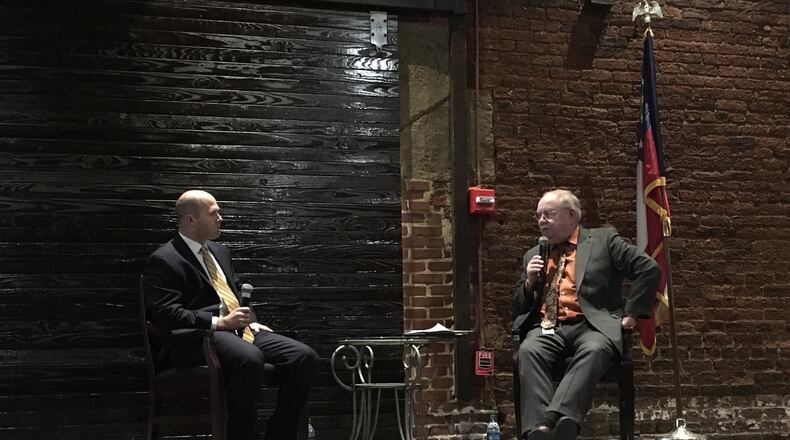The leading candidates for Georgia governor honed their economic policies Tuesday at a forum hosted by the Georgia chapter of National Federation of Independent Business.
The event, moderated by the AJC’s Jim Galloway, featured Democrats Stacey Abrams and Stacey Evans along with Republicans Casey Cagle, Hunter Hill and Clay Tippins. Brian Kemp appeared on video and Michael Williams, a state senator, was not invited.
Here are highlights from each of the candidates:
House Minority Leader Stacey Abrams
The Democrat pitched Medicaid expansion as a crucial incentive for small businesses. She said it would boost the state’s economy and generate tens of thousands of jobs while shoring up rural hospitals.
She also endorsed recently-passed state legislation that paves the way for new mass transit funding, but said she wants to the see the footprint enlarged beyond metro Atlanta.
“We have a good start in metro Atlanta and we have to think about mass transit as a statewide issue,” she said, invoking rural residents with limited mobility options.
“My worry is that we’ve concentrated so assiduously on solving the Atlanta problem that we’ve ignored the metro Atlanta and the rural Georgia problem.”
Lt. Gov. Casey Cagle
The Republican said his experience – and not his education pedigree – would help sway voters to his camp.
“The important thing that people look at when you’re measuring who is going to be lieutenant governor or governor is what is the experience you’re bringing to the table. I look at a person’s resume – they’ve done it before, can they do it again.”
When pressed on his support for a Medicaid waiver – he's the only GOP candidate to back that option - he said he would search for a data-driven approach that gives a "safety net that won't become a hammock but comes a springboard."
“Do you want people to be self-reliant or self-sufficient? Or do you want them to rely on the government?” he asked, adding: “I want to give people who fall on hard times help, but it needs to be temporary.”
Former state Rep. Stacey Evans
The Democrat said she would immediately push to expand Medicaid to “give folks not just access to healthcare but also access to jobs” and pledged to collaborate with small businesses if elected.
She said she would back more aggressive financial incentives for small businesses, saying “we compete with large businesses for tax credits and incentives, and I want to do the same for small businesses.”
She also drew laughs with a story about her first job waiting tables at Shoney’s.
“I think it should be a requirement across the board to spend some time working as a waitress or waiter because you learn a lot about people and being humble.”
Former state Sen. Hunter Hill
The Republican touted his plan to double state spending on transportation infrastructure while eliminating the state income tax. He said the state can slash funding in non-essential areas – though he didn’t specify where – to make up the deficit.
“We just have to have the willingness to bring to bear the resources,” said Hill, who also talked of the pressing need for a truck transit route that links from Columbus or LaGrange through I-16 and to Savannah’s bustling port.
He also pledged to eventually cap the sales tax rate at 7 percent while also expanding the number of goods and services that could be taxed.
“I’m going to create a fair and predictable environment, so the economy can grow,” he said.
Secretary of State Brian Kemp
The Republican appeared in a video address to trumpet his plan for a statewide spending cap, his crackdown on illegal immigrants and his anti-gang initiative.
“It’s time we had a governor that’s going to put Georgia families, Georgia citizens and Georgia small businesses first,” said Kemp.
Executive Clay Tippins
The Republican pushed back on his rivals’ plans to do away with the state income tax, saying that comparing Georgia to states like Texas and Florida that have eliminated the tax is faulty.
He said slashing the state budget by 10-15 percent – which he believes he can do by using data-driven techniques to retool state government – could allow lawmakers to cut the income tax by 2 or 3 percent.
“History shows us that the future is unkind to those that don’t reinvest and reinvent themselves when they’re riding high,” he said, saying the state must better slash inefficient spending and improve the literacy rate of elementary school students.
“This is a generational opportunity and with a business mindset, we can transform the state of Georgia.”
About the Author
The Latest
Featured




